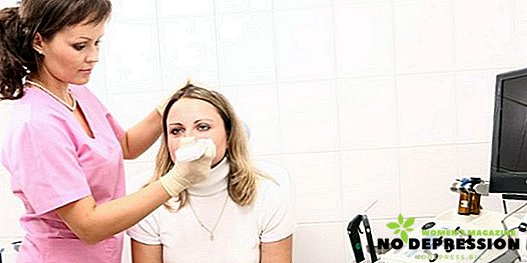For some reason, blood from the nose was at least once for everyone. Unsuccessful manipulations with hygienic procedures, strong blowing out, hit during physical education classes.
However, there are bleeding, which should be paid close attention, because they are a harbinger of a serious disease. This may be hypertension and diseases of the paranasal sinuses, impaired blood clotting and vascular fragility.
Depending on the nature of bleeding and the preceding symptoms, the doctor makes a diagnosis and prescribes treatment. With frequent bleeding, do not forget to consult a doctor for advice.
Types of nosebleeds in adults
Blood from the nose can go in any way. In some, it just drips, in others it flows like a stream, and it is difficult to stop it. Be sure to focus on blood loss in order to have time to call an ambulance.
Bleeding can be of several types, for example:
- Insignificant. A few drops of blood or can reach up to several milliliters;

- Moderate bleeding. The loss will be up to 200 ml of the total volume. There may also appear weakness, dizziness, pallor of the skin, flies before the eyes;
- Massive blood loss. On average, up to 300 ml. Symptoms include tinnitus, thirst, headache, shortness of breath;
- Profuse bleeding. Loss of 500 ml and more. It is difficult to stop such bleeding. Hemorrhagic shock may occur, pressure drops, lethargy or loss of consciousness.
All types of bleeding have a cause, so it is very important to understand the occurrence of a problem in order to exclude a critical condition.
Blood from the nose: causes in an adult
What can be the cause, we analyze in order:
- Overwork, stress, lack of sleep and rare stay in the fresh air;
- Exhaustion of mucous membranes due to dryness, dust (harmful production). May occur due to drug use;

- High blood pressure;
- Vegetative dystonia;
- Papillomas;
- Lack of vitamin C in the body;
- Rhinitis, sinusitis, adenoids, neoplasms;
- Vascular problems, including heart defects, atherosclerosis, hypertension;
- With allergies or asthma during exacerbations;
- When working in slope;
- Hemorrhagic diathesis, avitaminosis;
- Sun and heat stroke, overheating of the body;
- Sharp pressure drop (climbers, divers);
- Hormonal jumps in the body.
 The most common causes of bleeding are injuries. They may be accompanied by a fracture of the nose, so be sure to consult a specialist. The second common problem can be a long stay in the sun, overwork.
The most common causes of bleeding are injuries. They may be accompanied by a fracture of the nose, so be sure to consult a specialist. The second common problem can be a long stay in the sun, overwork.
Bleeding is minor, often passes on their own. Exposure to heat can also cause blood loss, and is usually eliminated fairly easily. Dryness of the mucous membranes and capillary fragility are more common among residents of megalopolises, as they are more likely to encounter overdried air due to air conditioners and batteries and the lack of vitamins and minerals.
Taking a certain type of medicine can also affect the capillaries. Therefore, you should pay attention to the problem if you take antiplatelet agents, vitamin K, hormones, acetylsalicylic acid. Often to dilute blood clots use drugs that can affect the frequency of bleeding.
For problems with the liver, in particular those related to alcoholism, you may also experience an increase in nasal bleeding. This is due to the loss of vitamins and thinning of the walls of the capillaries.
Bleeding from the nose at night or in the morning: causes in adults
Most often in adults, blood at night can go from overwork and lack of sleep. Sometimes it can be caused by sinusitis, rhinitis or high blood pressure. The most important thing is to get up and wash with cold water. If the blood is flowing continuously, the bleeding should be stopped with cotton wool dipped in hydrogen peroxide or a solution of vasoconstrictor nose drops. If even ice does not help, it is better to call an ambulance.
Intracranial pressure, hormonal failure can cause bleeding in adults in the morning. If a person did not get enough sleep, works in shifts, it is worth reviewing the work schedule and adding weekends. Persistent bleeding from the nose may indicate brittle blood vessels, a disease that has begun, or a lack of vitamin C.
Be sure to check for the presence of various diseases. The doctor often prescribes Ascorutin, if there is fragility of the vessels. With a dry mucous membrane, it can be prescribed to wash the nose with an isotonic solution, which can be done at home on its own.
Just stir half a teaspoon of salt in a glass of water.
Rinsing the mouth and rinsing the nose, when one of the nostrils needs to be drawn in, and then released, will help strengthen the walls of blood vessels, improve the surface of the mucous membranes and strengthen the immune system.
What to do when blood flows from the nose in an adult?
Most often, an adult responds adequately to bleeding, but some are afraid of it and may panic. First of all, it is necessary to calm the victim down, to create all the necessary conditions for his speedy rehabilitation:
- In case of moderate bleeding, the patient should be seated or laid on the sofa with the head elevated. It is not worth to tilt the head back strongly, otherwise vomiting may occur from the ingress of blood into the stomach.
- It is necessary to put ice or wet cold cloth on the bridge of the nose, if there is a refrigerator nearby, then you can cool the metal spoon in the freezer and attach it to the nose. With frequent bleeding, keep an ice pack in the refrigerator at home;
- If there is 3% hydrogen peroxide, then turunds can be made and placed in the nasal passages from the side where there is bleeding. It is best to press the cotton to the septum of the nose to stop blood loss.
- Alternatively, you can apply vasoconstrictor nasal drops;
- If none of the options helped, immediately call an ambulance, otherwise profuse bleeding may begin.

Be sure to consult your doctor if bleeding has become regular. This suggests that urgent action is required. The therapist, otolaryngologist will examine and prescribe the necessary medicines that will strengthen the blood vessels or cure the infection.
When the air is dry, you can purchase a humidifier at home, lubricate the nose with various vegetable oils such as olive or sunflower oil.
Treatment of nosebleeds (in hospital, at home)
In order to stop the bleeding, several methods are used in the hospital. Usually use hemostatic therapy, tamponade, anterior or posterior. Since the method is rather complicated, it should be carried out only in medical institutions.
The tampon can be impregnated with special solutions, including antibiotics. Sometimes it is administered for several hours, and sometimes left for several days. When tamponade produce fixation threads, so that it does not get into the respiratory tract. If it is impossible to stop the blood, the doctor may suggest surgery.
The doctor may prescribe a hematologist's consultation, and also ask to be tested for biochemistry, complete blood count and coagulogram. If the cause of the bleeding was a disease, then it is necessary to cure it, only in this case there is a chance to get rid of the bleeding.
At home, as mentioned above, you can use:
- Ice;
- Hydrogen peroxide 3%;
- Cold objects;
- Drip nose drops;
- Alternatively, you can try contrasting baths, when the hands are immersed in cold water, and feet in hot. However, in the presence of thrombosis, it is better not to experiment;
- A small tampon.
The patient must be calmed down, seated on a chair and recommended to breathe more easily. This will help reduce the pressure and calm the heartbeat. Blood flow to the head will decrease and, possibly, nosebleeds will stop.
You should not use various drugs and folk remedies, if the blood does not stop, it is better to contact an ambulance.
What not to do if the blood from the nose of an adult
If blood flows in a thin stream, it will quickly stop and collapse. But with abundant bleeding bright red, and even from the mouth, it is necessary to sound the alarm. There is no stopping the blood here, and an urgent need to call a doctor.
You can not blow your nose, the blood can go stronger. Do not tilt the head too much, the blood can get into the stomach, and vomiting will begin. You also do not need to tilt your head down and forward, as the bleeding will increase.
It is necessary to unbutton your clothes if it squeezes the neck, sit on a chair, stop panicking. Many are frightened by the sight of blood, so they rush around the room or even faint.
Do not take alcohol or medication without a doctor's prescription, it can aggravate the situation. If you do not know what a person does not tolerate, the best remedy is a tampon from gauze or cotton in the nose and cold to the nose bridge.
For more information on the causes of nasal bleeding in adults, see the next video.















